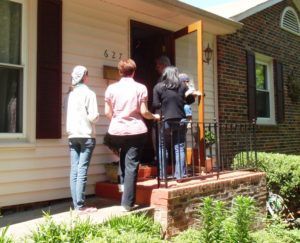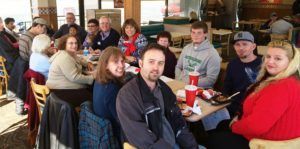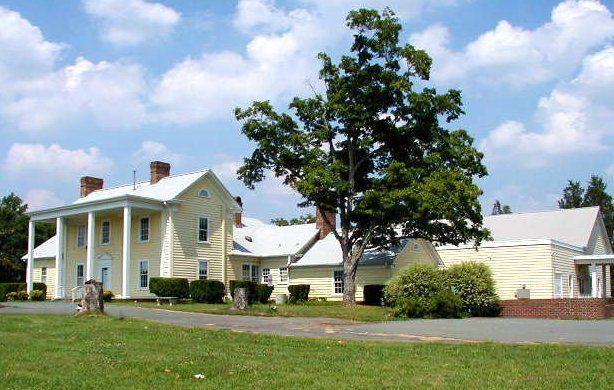
Thoughts for a New Year: Vision, Values, and Methods Matter
Life Community Network morphed out of Liberty Church, which operated as a more traditional church from 1990 until Easter Sunday, March 31, 2013. By traditional, I mean we centered most of our ministry around our building. After fasting, prayer, and much seeking of the Lord, we began to transition to what we are today – a mission centered church.
We believed that what we were going to attempt was so radically different that we decided to put Liberty Church “in the grave,” and we began our journey in our new format using new methodology with a new name on the first Sunday of April, 2013. So it’s been over 3 1/2 years. What exactly were the changes and why did we make them?
A Little History
Liberty Church was an offshoot of Maranatha Church in Greensboro, which Pastor Pete’s Dad founded and pastored for many years. Several people from Burlington started attending and were interested in seeing if something similar might be started here in Alamance County. Pastor Pete (That’s I!) had been serving as an associate pastor and principal of Maranatha Christian Academy, but was feeling the call to pastor. So it seemed to be a natural fit for him to begin working in the Burlington area. So, in 1989, a small group was launched in the home of one of the interested parties. To be very concise, new people were gradually added so that eventually it became time to move forward with an official church plant. We adopted the name Liberty Church because we wanted to experience the liberty or freedom of the Holy Spirit. We had our first meeting in May of 1990. We moved around a lot in those early days from building to building, all rentals. Eventually we settled into a property on Jim Barnwell Rd. It was a beautiful facility with 24 acres and a 13,000 SF building. We thought it was our permanent facility, but we ended up only staying there for about 18 years or so. Then it happened.
Reevaluation Time
Pastor Pete and the elders decided to ask the church to participate in a forty day fast and prayer time. The purpose of this exercise was to bring Liberty Church before the Lord and ask him to speak to us about where we had been and where he wanted us to go. We divided each day up by hours and asked our people to sign up for periods of time to fast and pray so that the entire forty days would be covered. We also set up weekly gatherings in homes where people got the opportunity to pray and share what they felt God was speaking to them. It was a very rewarding experience. Here are the two main takeaways.
Unity
We kept hearing the Lord speak to us about unity. We believed we had a very high level of unity, but that would soon be tested.
Mission
The single most significant thing the Lord made clear to us was that, although we had done a number of very important things over the years, we had not prioritized what was most important to him – the fulfillment of the Great Commission. We had preached good messages, taught sound doctrine, had good worship, promoted healthy fellowship, met in small groups, and even done outreaches. We had emphasized the Person and work of the Holy Spirit, the Word of God, and personal holiness, but we had not made disciple making our highest objective. Oops.
Restructuring
We took God’s message to us very seriously and the elders spent some weeks continuing to seek the Lord about rethinking and rewriting our mission and values statements in light of what we just learned. We were laying the foundation for a complete course correction. It was during this time that some rumblings occurred that ripped at the supposed unity we thought we had. Before it was over around a third or more of the church decided it was not on board with the direction we were heading. One thing I learned during that time is that the surest way to get the devil mad at you is to pursue being focused on the Great Commission. The good thing was that pretty much everyone was unified around our new mission afterward.
 Gradually things began to change. We launched something we called Mobile Ministry. We paired up and knocked on doors on specific streets assigned to us in our target neighborhood – Town and Country, which has been put on the heart of one of our people during prayer. We wore Liberty Church Mobile Ministry t-shirts to identify ourselves as “not a cult.” We told whoever came to the door that we were in the neighborhood to be a blessing and could we pray for them? Most people allowed us to do so, and some responded in a very positive way to our bringing “church” to them. We adopted certain streets and kept going back week after week to pray, talk, and get to know whoever wanted to do that. Over time we made some good friends and our hearts started to get connected to this group of people, many of whom had no church. Another thing we learned is that Mobile Ministry turned out to be more life giving and “fun” than “regular” church. Unfortunately, many of those who started out in that ministry began to drop out from participating in the weekly excursions. Most Sundays afternoons, as I remember, it was just one other elder and myself, but we loved it. Sometimes we showed up more out of a sense of commitment than desire, but as soon as we interacted with someone around the Lord, we remembered why we set aside that time. It was well worth it!
Gradually things began to change. We launched something we called Mobile Ministry. We paired up and knocked on doors on specific streets assigned to us in our target neighborhood – Town and Country, which has been put on the heart of one of our people during prayer. We wore Liberty Church Mobile Ministry t-shirts to identify ourselves as “not a cult.” We told whoever came to the door that we were in the neighborhood to be a blessing and could we pray for them? Most people allowed us to do so, and some responded in a very positive way to our bringing “church” to them. We adopted certain streets and kept going back week after week to pray, talk, and get to know whoever wanted to do that. Over time we made some good friends and our hearts started to get connected to this group of people, many of whom had no church. Another thing we learned is that Mobile Ministry turned out to be more life giving and “fun” than “regular” church. Unfortunately, many of those who started out in that ministry began to drop out from participating in the weekly excursions. Most Sundays afternoons, as I remember, it was just one other elder and myself, but we loved it. Sometimes we showed up more out of a sense of commitment than desire, but as soon as we interacted with someone around the Lord, we remembered why we set aside that time. It was well worth it!
We also changed the structure of our Sunday morning gatherings. We grew to like the small group discussion format. I would preach a short message. Then we would break into small groups scattered throughout the sanctuary. The groups would discuss the sermon. What we noticed is that the people loved to do this. It was as if they “came alive.”
Then we started thinking more radically: what if we made everything we do be about mission? What if we jettisoned the things that have nothing to do with mission? Would that be good? The mission, as we understood it, was to make followers of Christ who fished for people -as Jesus put it, disciples. Jesus spent time teaching his disciples, but he also spent a lot of time showing them how to do ministry outside the walls of the synagogue or temple, and then he let them do ministry. Was this the model? Were most of our ministry opportunities inside the building or outside? Was ministry supposed to happen for an hour or two once a week in a building, or all week long wherever we might find ourselves? How could we prepare our people to become “outside the building and meeting” disciples? This is what we understood to be the missional task.
Over time we started having some of our meetings in other places, like restaurants, homes, and parks. We would meet once or twice a month outside the building, and the rest of the time at the building. As we got more attached to the people in the neighborhoods in which we worked, we realized that it was more in line with our vision to meet in small groups in or near those neighborhoods than to ask them to drive out into the country to our building. Eventually we made the leap and left the comfortable confines of our beautiful facility. It was a big step, but one we have never regretted. No more lawns to mow, bathrooms to clean, carpets to vacuum, trash to haul, floors to mop, or walls to paint! All the time we spent doing those things can now be invested in time with people!
Things We Have Learned along the Way: Vision and Values
Needed: People Who Care about People
As we went door to door doing Mobile Ministry, we discovered that the secret to success was simply caring about the people we met. Behind every door some sort of drama and suffering was playing out. The question was would the people inside those doors open their hearts to us or not. People respond to love, and many of them were truly desperate, yet alone. In many cases, we were answers to specific prayers. I remember one person telling me that when we arrived, she felt that God was giving her another chance. Jesus’ words in Matthew Chapter Nine came alive.
Jesus traveled through all the towns and villages of that area, teaching in the synagogues and announcing the Good News about the Kingdom. And he healed every kind of disease and illness. 36 When he saw the crowds, he had compassion on them because they were confused and helpless, like sheep without a shepherd. 37 He said to his disciples, “The harvest is great, but the workers are few. 38 So pray to the Lord who is in charge of the harvest; ask him to send more workers into his fields.” Matthew 9:35-38 (NLT)
Who are the needed workers? Shepherds, people who care about people. God is looking for his people to leave their comfort and ease and invest themselves into the lives of those who live, work, and play all around them, so they can know the Good Shepherd, too!
Discipleship Involves Teaching and Doing
Traditional discipleship, as we have known it, mostly centers around teaching our most faithful and promising people how to better understand the Bible and live decent, moral lives, so they can be ministry leaders. Jesus did not do things this way. His way included some teaching, a lot of doing, feedback and correction, doing, teaching, and eventually launching. Taking people with us to do Mobile Ministry provides opportunities to demonstrate how to engage people, how to pray, how to counsel, how to share the gospel, and to talk about any number of things along the way. It turned out to be a great discipleship format that moves people into mission.
Kingdom Is More Important than Any Local Church
Another thing we became convinced of, and have to remind ourselves often, is that God wants us to prioritize his kingdom, not our church. That means we invest our lives in people who may never become part of LifeNet. This has played out over and over again. We bless and disciple people, whether they end up joining us or not. God will take care of us, if we seek first his kingdom. This is the exact opposite of how many churches operate.
We Can Make Our Neighborhoods Better Places to Live
LifeNet adopted the tagline: Neighbors helping neighbors to experience God’s love. God wants us to get to know our neighbors, care about them, pray for them, serve them, and spend time with them. When people experience this kind of love, it changes them. The atmosphere of an entire neighborhood can be changed by one family making the commitment to act out their faith. Since adopting our new format, vision, values, and methods, I have more non-Christian friends than ever. How refreshing to be around non-religious people! What a great opportunity to share God’s love!
Throw Out the Report Card
By nature, we like to measure things. Success is something we try to quantify. Can you measure success by dollars, property, power, or growth? Maybe in the world you can, but God’s kingdom is quite different. In fact, the kingdom of God, in many ways, is the exact opposite of how the world does things. In America and throughout the West, for centuries now the church has adopted the measuring stick handed to it by government and business. Many large churches today are run more like businesses than anything else. They have to be: there are too many working parts.
When we launched using our new model, we stepped out of the realm of traditional church measurements – buildings, bucks, and bodies, the way most people evaluate church success. God specifically told us to throw out every form of measurement, every “report card,” and look to him only. If we are going to put kingdom first, it turns out that many people we help will become better church members somewhere else. It doesn’t look good if we are trying to measure success, but God sees it. Just like with personal justification, we have only one measuring stick – Christ. Resisting the urge to measure success is difficult in a “success driven” world, but we have discovered that it is so liberating.
Activating People
If disciple making is our first priority, we have to resist the tendency to put our best foot forward when it come to ministry. In other words, we are training centers, not entertainment shows. The small group leaders at LifeNet are always trying to help other people develop their skills and competence in ministry, with the goal of their one day leading ministry on their own. Therefore, at any given meeting the most qualified teacher may not be teaching, as he or she steps out of the way to help others develop. God never meant for our meetings to be events where we merely spectate. That is a great deception. Unless we are doing the work of the ministry, we are falling short and not true disciples. I don’t know about you, but I expect our disciples to be doers, not mere spectators.
The Genius of Bible Study Discussions
 One of the most important tools we have developed is the small group discussion format. Instead of lecturing our people, as most churches do, we present the Bible in the format of guided discussions. We break down the Scriptures into small chunks, do a minimal amount of teachings, and ask questions that guide people think about how the Bible should be applied to everyday living. How to do this in a way that invites people to participate without intimidating them is a developed skill. The leader knows where the discussion is going and keeps it on course; although, at times what happens is that the discussion goes off in an unplanned direction that is better than the original plan. We have heard people say that by using this format they learn so much more. They can ask questions when they do not understand. The teacher gets immediate feedback on what the people understand. The group is enriched by what each person contributes. As one person recently said, “It’s pure genius.” We give the Lord credit.
One of the most important tools we have developed is the small group discussion format. Instead of lecturing our people, as most churches do, we present the Bible in the format of guided discussions. We break down the Scriptures into small chunks, do a minimal amount of teachings, and ask questions that guide people think about how the Bible should be applied to everyday living. How to do this in a way that invites people to participate without intimidating them is a developed skill. The leader knows where the discussion is going and keeps it on course; although, at times what happens is that the discussion goes off in an unplanned direction that is better than the original plan. We have heard people say that by using this format they learn so much more. They can ask questions when they do not understand. The teacher gets immediate feedback on what the people understand. The group is enriched by what each person contributes. As one person recently said, “It’s pure genius.” We give the Lord credit.
More Fun than Doing “Regular” Church
One of our leaders said that he could never go back to the old way of doing church. I agree. In some ways, it’s easier to run things the way we did in the past. It becomes more of a “set” thing – same place, time, and menu. Set up is easy. Just turn on the lights, the sound system, and wait for the people to come. But Jesus did not say, “Come follow me, and I will make you good church attenders.” He is determined to make us fishers of men. The fish we are after don’t usually come to church, and, if prognosticators are right, that will become increasingly the way it is in the future. We are learning how to operate in a way that will work even in a non-church friendly environment. LifeNet as a rule does not go after people who belong to other churches. We are looking for those who do not yet know Christ or who are not in a church. We offer them an alternative if traditional church has turned them off. We are a real church done differently. Simple church.
Simple Church: The Medium Is the Message
By getting out into the neighborhoods and on a small group level, church is more “real” and personal. People are seen and heard and know they have been counted and loved. Those who do not want that kind of church can go to any number of churches where they can remain very anonymous and merely sit, watch, and listen to others do the ministry, without anyone necessarily even knowing their names. That is not going to happen at LifeNet. In fact, if you come to LifeNet, you have already made some pretty large choices that relatively few people at this point seem to be ready to make.
The early church met in homes and the porch of the temple. They did not have their own buildings, sound systems, large worship bands, children’s programs, or any of the things that drive so many larger churches today. They had the Lord, the Bible, and each other. The persecuted church in many countries today also is required to meet in secret in small groups. They cannot get too loud, lest they draw unwanted attention to themselves. They cannot advertise using the latest marketing skills. But these small groups thrive and multiply. The fact of the matter is that the church is able to go very simple and still thrive. Some believe the church does best when it is very simple.
LifeNet does not have a lot of the “bells and whistles” that many larger churches have. We will never be your “one stop shopping mall” kind of church. If you must have those things, you will not end up at LifeNet. I sometimes ask people, “What would you be willing for your church to stop doing before you would stop going there?” Obviously multitudes of people are willing for their churches to stop effective disciple making. Some are even willing for their churches to stop evangelizing, or even following the Bible. At LifeNet, this is a question, our people have already answered. They have decided that powerful programs, thrilling worship, dynamic preaching, impressive buildings, and success measured in buildings, bucks, and bodies, is not what they are after. But if you want to experience loving relationships, connectedness, participation in ministry and mission, we might be the place for you. We make no excuses for keeping things simple. For us, it’s part of the mission. The medium is the message.
Concluding Thoughts
We are now three and one-half years into our journey, but we are still very much in learning mode. We do not pretend that we have “arrived” or are doing things extremely well. One of our leaders often says, “I am a Christian, but I am not very good at it.” It isn’t that he is not committed and pursuing God. It simply is that we are very imperfect. We are pursuing the Lord and his call upon our lives. We know we are not the only good church in Alamance County or even the best expression of church, but we do believe we are a good church with a God-given mission. We are always praying for the Lord to join to us those he wants us to disciple, those who want to partner with us in God’s mission, and those who believe in what we are doing. We try to be the answer to other people’s prayers. Maybe you are the answer to ours.
In the coming year, my hope and commitment is to work hard at equipping others in LifeNet to do the ministry. We are launching a workshop in January to help potential small group leaders learn how to prepare Bible discussion guides. This will be one of four areas of focus: ministry skills, leadership competency, counseling ability, and Bible study preparation skills. Perhaps God will put it on your heart to work at preparing yourself for what he wants you to do in the future. Remember, God never meant for Christianity to be a spectator sport.
Also, can we all make a renewed commitment to pursuing the people who live, work, and play around us? We can do this by extending our friendship, praying for them, inviting them into our homes, going to visit them, and sharing the gospel. I believe there are many people in our neighborhoods in whom the Holy Spirit is right now at work. What a joy to be part of that!
And, last of all, but not least of all, please pray. God is the only one who can pull this off!
Love you guys,
Pastor Pete
Come join us!
We welcome you to be part of our community!






